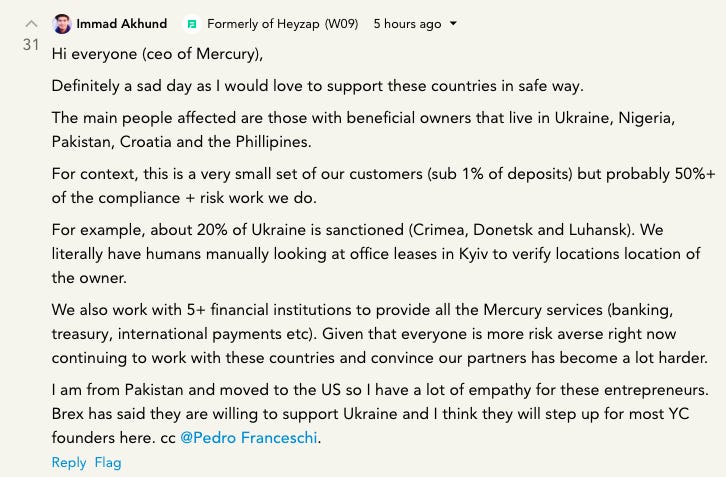
Discover more from Fintech Radar
Issue #121: Revolut Finally Secures A UK Banking License, Stripe Gobbles Up Lemon Squeezy, And Financial Database Startups Are the New Hotness
👋 Welcome to another edition of Fintech Radar, your weekly go-to source for deep insights into what’s happening in fintech.
If you’re new, here is a breakdown of what you can expect from each issue.
This weekly missive is written for founders, operators, and investors in fintech. I prioritise quality, depth, and provocation each week over just rehashing press releases and partnership announcements. Rather than simply covering news, I dig in and explore the implications of what’s happening in the industry — without all the fluff.
My goal is to spark discussion, highlight emerging trends in fintech that could become central themes in the coming years, and help you connect the dots.
If you missed our recent editions, you can catch up here. Some previous issues you might want to check out if you’re new include “A Deep Dive Into The Cash App's Growth Machine”, “The Future Of Payment Initiation”, and “Current: Doing It Differently”.
Your ad could be HERE!
Fintech Radar is a must-read for founders, operators and investors in fintech. If that’s your target audience, placing an ad right HERE is a cost-effective way to reach them.
If this sounds like a good fit for your brand head over to our sponsorship page for more details and to secure your advertising slot. Prices start at $100 per issue!
If you have any questions, reply to this email and ask away!
⤷ Revolut receives long-awaited UK banking license
🏃♂️ The Rundown: Revolut has secured a banking license from the U.K.‘s Prudential Regulation Authority (PRA).
Revolut now holds a banking license in the European Union and the U.K., enabling it to expand its banking services in its home market. The U.K. is its most critical market, with 9 million of its 45 million global customers. The PRA granted an authorisation with restrictions, initiating a “mobilisation” phase that could last up to 12 months.
🥡 Takeaway: There are probably many in fintech land who thought this day might never come for Revolut. I’m sure some corks are being popped over at Revolut, as they celebrate proving those naysayers wrong. That said, they’re not quite out of the woods yet with their license, as they’re still in the “mobilisation” phase.
So what will this mean for Revolut?
Given all the scuttlebutt about their looming listing, one would imagine this will bolster their prospectus in anticipation of going public.
More practically, having a license in their largest market means they won’t need to rely on banking partners to the same extent — they’ll control their destiny when it comes to accessing payment pipes in the UK. This shouldn’t be underestimated. If you ever speak to founders about their calculus when looking to get a banking license, this is generally a major factor.
Tied to this last point, being ‘closer to the metal’ will allow them to meaningfully bend their cost structure. Yes, there is the increased cost of being a license holder — but that is likely minimal for a player the size of Revolut at this stage of their journey.
Then there is the obvious ability to offer more lending products — all at a better cost of capital.
I also wouldn’t be surprised if this bolsters their chances of getting a U.S. license, as the halo of being a “bank” in the UK could carry over across the pond.
⤷ A perfect blend: Lemon Squeezy x Stripe
🏃♂️ The Rundown: Stripe has acquired Lemon Squeezy, a startup that serves as a merchant of record for sellers of digital products. Lemon Squeezy, which hit over $1m in ARR within nine months of its 2021 launch, had been processing payments on Stripe since its inception.
This acquisition follows Stripe's recent purchases of Supaglue and Okay, enhancing its capabilities in merchant of record services and analytics
🥡 Takeaway: Reviewing Stripe’s 15 acquisitions, they’ve tended to veer towards acquihires or bolt-on purchases (for example, TaxJar), and, beyond the notable exception of Paystack, Stripe has avoided buying competitors.
Lemon Squeezy, on the other hand, seemed to be positioning itself as a competitor to Stripe by focusing on offering a more turnkey approach to payments. Their counter-positioning was interesting as it sat in a rare weak spot for Stripe, which doesn’t have a Merchant of Record offering.
Anecdotally, Lemon Squeezy appeared to be gaining mindshare among some niche communities by focusing on the drudgery of managing a digital product business, which seemed to resonate with indie hackers.
There can be lots of compelling reasons to go and gobble up a competitor. But for Stripe, a company with a strong internal culture of building and not buying, this represents a notable deviation from that. It might have been easier to snap up the 13-person company vs. building a solution, but it also might indicate that they’re starting to take their competitors more seriously.
⤷ Restrictions on onboarding new customers lifted at UK fintech Modulr
🏃♂️ The Rundown: UK fintech Modulr has had a temporary ban on onboarding new customers lifted by the FCA but must give a 10-day notice before adding new agents or distributors. The company, backed by PayPal, provides payment services to clients like Revolut and Sage.
According to the report, Modulr has improved its onboarding and oversight processes following these regulatory concerns, enabling it to resume onboarding with FCA oversight.
🥡 Takeaway: We are now in a period where regulators are more ready than ever to drop the hammer on fintech startups whose controls are not up to snuff, and banking partners are tightening the screws to ensure they are not the next to get embroiled in a “Synapsing.” It is hard out there for fintech startups.
Although it has taken some time, startups are learning that having a world-class compliance function is a massive strategic advantage. Long gone are the days when banks would bend over backwards to slurp up those tasty deposits from signing up startups. It was a time when implementing robust controls only limited your ability to grow your partner bank proposition. The same goes for BaaS providers who have been as a result feeling the heat — from their partner banks and regulators.
The reality is being great at compliance has always been important — but now it’s clear you cannot survive without it. It’s no longer a nice to have; it is a necessity. Welcome to the new reality.
⤷ Mercury stops serving startups in several countries
🏃♂️ The Rundown: According to reports, Mercury last week announced that it was no longer servicing customers from certain countries including Ukraine, Nigeria, and other high-risk compliance countries. The article notes that the company cited complexities arising from U.S. sanctions and a commitment to compliance as reasons for the policy change.
🥡 Takeaway: It’s in vogue at the moment to kick fintech startups over compliance issues. Yes, compliance is hard, but that’s part and parcel of building a company in a highly regulated industry.
This is the reality: If your policies and procedures are soft, you get slapped by regulators (see the above and below articles). If you tighten your controls (in this case likely at the behest of their sponsor bank) you get turned into the topic du jour on fintech Twitter that day and, more importantly, potentially stunt your company’s growth. Damned if you do, damned if you don’t.
Practically, getting the balance right is hard. Immad’s comments below illustrate the issues you face when trying to serve customers in compliance hot spots. It’s a real challenge and it’s only getting harder as regulators turn the screws even tighter on banks working with fintech startups.

⤷ Coinbase UK subsidiary fined $4.5 million by FCAC
🏃♂️ The Rundown: Coinbase’s UK subsidiary, has been fined £3.5 million ($4.5 million) by the FCA for repeatedly breaching rules by providing services to 13,416 high-risk customers. According to the article, these customers deposited around $24.9 million, facilitating $226 million in transactions through other Coinbase entities. This enforcement action marks the FCA's first under the Electronic Money Regulations 2011.
🥡 Takeaway: Yet another reminder that getting compliance right all the time is hard — even for sophisticated listed players like Coinbase, who’ve been working on building (by necessity!) a world-class compliance function for over a decade.
Nothing new, but as noted above, the tide has turned, and it’s only getting tougher out there for startups.
⤷ Fintech Fragment eases ledger problems, nabs $9M from Jack Altman, BoxGroup, and others
🏃♂️ The Rundown: Fragment, a startup that offers a ledger API that simplifies real-time, double-entry accounting for engineers last week announced that it had secured $9m in seed funding from Stripe, BoxGroup, Avid Ventures, The Fintech Fund and notable operator angels like Zachary Perret, Jack Altman, and Emilie Choi.
Fragment aims to compete with companies like Modern Treasury by providing fintech developers with tools designed to make it easier to exchange value online, plans to use the new funding to expand its engineering team and invest in go-to-market resources.
🥡 Takeaway: The collapse of Synapse has put a spotlight on how companies manage their internal ledgers. What was a niche topic only a few months ago has now become a hot segment, with two startups announcing a round last week (TigerBeetle announced a $24m raise as well).
The tl;dr: General-purpose databases give you the row-level “engine,” but you still need to build the financial transactions “chassis” that handles all your double-entry transactions, reconciliation, etc. If you want to learn more, you should check out this presentation from the team over at TigerBeetle — it’s the best presentation I’ve seen on the topic.
It’s easy to think this issue is isolated to pure-play financial services, but it’s not. Whether it’s metered billing for your SaaS app or solar panels, double-entry ledgers are everywhere. You can expect this segment to remain hot as investors rush in to find the MongoDB of financial databases.
⤷ Jarvis secures £1.8 million funding to empower workers
🏃♂️ The Rundown: Jarvis last week announced it has raised £1.8m in seed funding to enhance retirement planning tools for a workforce increasingly moving towards self-employment.
Its platform offers a comprehensive solution that includes a pension management app and an auto-enrolment workplace pension, designed to simplify financial management for both employees and employers.
🥡 Takeaway: There are a ton of data points that suggest most people aren’t prepared for retirement. The need for products in this space is really clear. Yet, the gap seems to be convincing people that they need to prepare for an event decades into the future. It turns out we’re all myopic when it comes to our finances.
There are many in the consumer fintech space thinking through how to attack the opportunity — for example, Monzo last week launched a pension product — yet the challenge remains the same — convincing people to do something today for a problem they’ll face tomorrow. It’ll be interesting to see if any products in the segment can break through and gain serious adoption.
⤷ Klarna CEO Sebastian Siemiatkowski on Getting AI to Do the Work of 700 Customer Service Reps
This is a great chat with Klarna’s CEO, Sebastian Siemiatkowski, on Sequoia’s new AI-centered podcast. In it, he talks about how they’ve been able to be one of the few at-scale fintechs to lean into using AI in their day-to-day workflows.
We’ve all heard about how the company’s OpenAI-powered assistant is already managing two-thirds of customer service chats in its first month. But Siemiatkowski also chats about how he jumped on a plane to SF to convince Sam Altman to work with Klarna early on. It’s a great pod and well worth adding to your podcast playlist this week.
⤷ How Transferwise Acquired Their First 5M Customers: The Two Types of Content All Companies Must Create, How to Crush Competition With Performance Marketing, What Growth Hacks Worked and Did Not with Nilan Peiris, CPO at Wise
Nilan Peiris, Chief Product Officer at Wise, shares insights on scaling the company to its first 5 million customers on this episode of 20VC. He discusses some of the common pitfalls startups encounter when building out growth channels, knowing when to diversify marketing channels, and the importance of creating different types of content. It’s a great tactical episode and well worth adding to your playlist.
❤️ Show Some Love For FR
📧 Feel free to reach out if you want to connect. I'm @alantsen on Twitter, or you can DM me directly by clicking the button below ↴
Ps. If you like what I'm doing with FR, please share it on your social disinformation network of choice. I'd also appreciate it if you forwarded this newsletter to a friend who might enjoy it.
🙏 What did you think of this week's issue of FR?
I love it! ◌ I Like It ◌ Not Bad ◌ I Don’t Like It ◌ It’s Awful
















